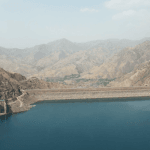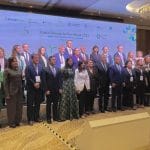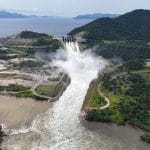Rather than taking a hard line against Russia over its invasion of Ukraine, Turkey’s President Recep Tayyip Erdogan has agreed with his Russian counterpart, and sometimes close ally, Vladimir Putin, to form a natural gas hub in Turkey, which the Kremlin said could supply Europe with gas.
If realized, the initiative would be a significant political move by Ankara and Moscow that directly challenges the West and its support for Ukraine, while blatantly helping Putin to circumvent the Western alliance’s sanctions levied against Russia for its unprovoked war against a sovereign state.
Ronald Meinardus, a German foreign policy expert, told NE Global in Athens, ”Politically, this throws light to Erdogan who in the past three months, if I’m not mistaken, has met Putin four separate times and he’s doing many things that I would call ‘sanctions busting’. He’s certainly not agreeing with his Western partners’ sanctions. He’s opening the door for Russia (to have access) to the West and to the global markets (despite the strict sanctions against Moscow) … this is very unfortunate for the Western alliance.”
“What Erdogan seems to suggest is that he has access to Putin. He assumes that the West is interested in this because they want to have some sort of possibility of talking to the Russians,” Meinardus said, adding, “My sense is that the West would want him to be a little more modest and a little more constructive while also helping to isolate Russia economically, but he’s doing just the opposite.”
Gazprom’s supplies to Europe have drastically decreased ever since Moscow decided to slash its deliveries to Europe after the West mobilized its economic and military power to assist Kyiv in its resistance to Putin’s increasingly brutal invasion of Ukraine and after the Russian-built Nord Stream pipelines were damaged by explosives allegedly planted by Russian saboteurs.
The creation of a gas hub in Turkey was discussed during a face-to-face meeting between Erdogan and Putin in Kazakhstan. The two leaders instructed their energy authorities to begin an immediate technical study for the project, with Erdogan reportedly suggesting locating the hub in Turkey’s northeastern Thrace region, bordering Greece and Bulgaria.
“Who would finance this?” Meinardus asked. “It’s not that the Turks have tons of money, and it’s not a case where the Russians have tons of money. They would first have to do a feasibility study, and I highly doubt that with the potential political ramifications they would find investors to put billions into any project like this,” he added.
Meinardus said the proposal to ship gas to Europe, via Turkey, is unlikely to materialize.
“This is about providing a product to a market. First, you need a seller; then you need a buyer. You have a seller, which is Putin, and you have him possibly cooperating with Erdogan. But you have a prospective market – Europe – which at this point in its history is doing what it can to reduce its dependency on Russian gas and on oil. The idea that this would see the light of day, and that Russian gas would arrive in Europe via Turkey, is very remote and very unrealistic,” said Meinardus.
Most of the countries in Europe are, after 20 years of short-sighted energy security policy, looking to decrease their reliance on the Russian Federation, particularly after Moscow repeatedly used energy as a weapon to browbeat the European Union’s institutions into giving in to the Kremlin’s demands.
Geoffrey Pyatt, the State Department’s new Assistant Secretary at the Bureau of Energy Resources, said during his October visit to Istanbul, Bucharest and Sofia that he discussed joint efforts on European energy security with his Turkish, Romanian and Bulgarian counterparts.
Pyatt said the Americans’ are fully committed to bolstering European energy security and pledged to work with US partners to improve the region’s energy interconnectedness in order to avoid having the Europeans become dependent on a single anti-Western country for trade and development.
“Russia has time and again proven that it will not be a reliable supplier of energy so long as it continues to weaponize its energy resources as an instrument of war,” Pyatt said.








